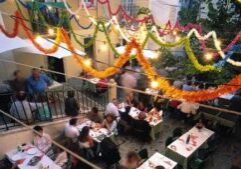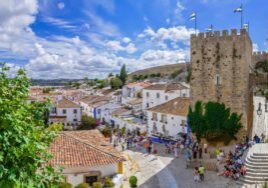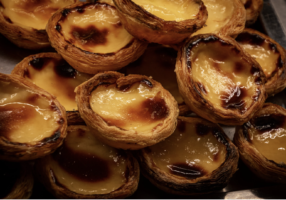Fighting over Portuguese specialities: what are your favourites?
Portuguese gastronomy is made up of many dishes with different flavors. Among these, some Portuguese specialties have striking similarities, and today I’ve chosen to put them in competition with each other by introducing you to several must-try dishes of Portuguese gastronomy.
Are you ready for this “Battle” of Portuguese specialties? Go for it!

1 – Bifana VS Prego
Bifana
Bifana is one of Portugal’s must-try specialties. It’s a bread-based sandwich topped with thin slices of marinated pork and served hot. It’s considered a popular “street food”. It is often served in bars and small traditional Portuguese restaurants called “tasca”. This “on-the-go” dish is very popular with locals and tourists alike.
The story goes that bifana was invented in the 1920s by workers in Lisbon’s factories. The workers were looking for a quick, easy and inexpensive snack, and that’s how the bifana was born. The sandwich became very popular in the 1950s.
It is so popular in Portugal that for many years, fast-food giant Mc Donald’s offered the Mc Bifana in Portuguese Mc Donald’s.
Prego
Bifana’s main competitor is prego. It’s the same concept, but instead of pork, the bread contains beef. Prego can also be served on a plate, “prego no prato” (translation: prego on the plate), or in bread like bifana, in which case it’s called “prego no pão” (translation: prego in the bread). Depending on where you eat it, cheese is sometimes added to the beef.
Here’s my address for the best “prego no pão” in the world: “Casa dos pregos: venham mais 5”. As its name suggests, this tasca (small, typical restaurant) specializes in “prego”, and makes this clear with the slate on its sidewalk, which reads: “aqui come o melhor prego em pao do lombo boi com queijo da serra” (here we eat the best beef and cheese prego in bread).
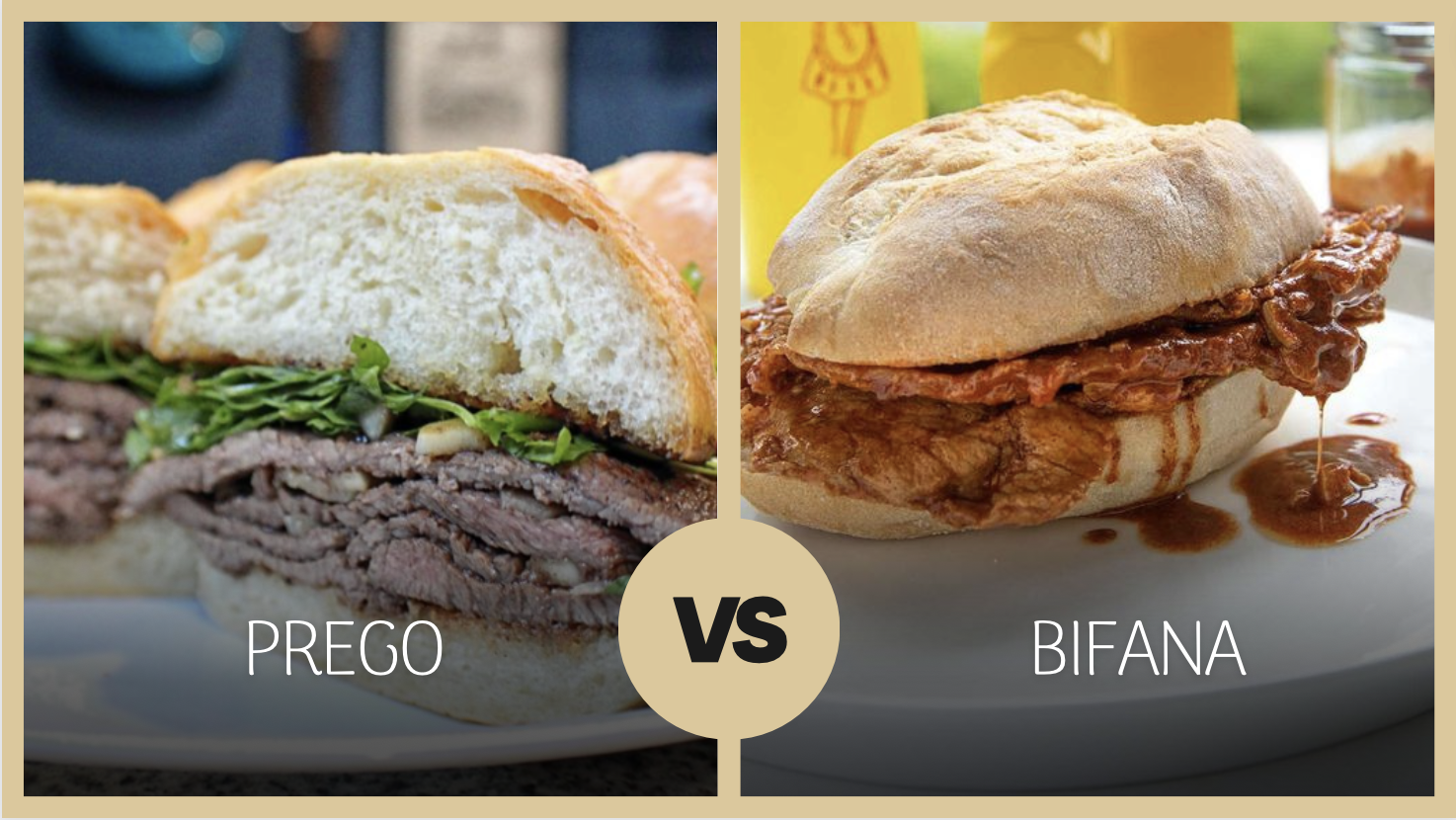
Prego VS Bifana
2 – Francesinha VS Tosta Mista
Francesinha
Literally translated as “the little French girl”,Francesinha is the gourmet version of the French “Croque-Monsieur”. Made with bread, ham, linguiça(Portuguese sausage), cheese and sauce… As you’ll have gathered, it’s a dish that “keeps you going”.
The father of the francesinha, Mr Daniel Da Silva, was a chef who emigrated to France, and when he returned from Portugal, he created a Portuguese version of the croque-monsieur. He added typically Portuguese ingredients such as “linguiça” and, of course, the famous sauce whose recipe is kept “secret”.
This dish can be found all over the country, but Porto locals like to say that the best francesinhas are those from Porto. The “Verso em Pedra” restaurant in Porto even offers a challenge based around this dish. If you manage to eat a giant francesinha on your own in one hour, you win a guitar!
Tosta Mista
Although the francesinha is considered the alter ego of the French croque monsieur, for me the closest thing to the French croque monsieur is the francesinha’s competitor in Portugal, the tosta mista (pronounced “Touchta Michta”).
You’ll find tosta mista everywhere in Portugal! Everywhere! It’s bread: either sandwich bread (pão de forma) or farmhouse bread (pão saloio), topped with ham and cheese. It is then crushed in a heated press. For presentation, it is often cut into halves or thirds, and sometimes a little thyme is placed on top. The sandwich version of Tosta Mista is very similar to the famous French Croque-Monsieur, but without the béchamel sauce.
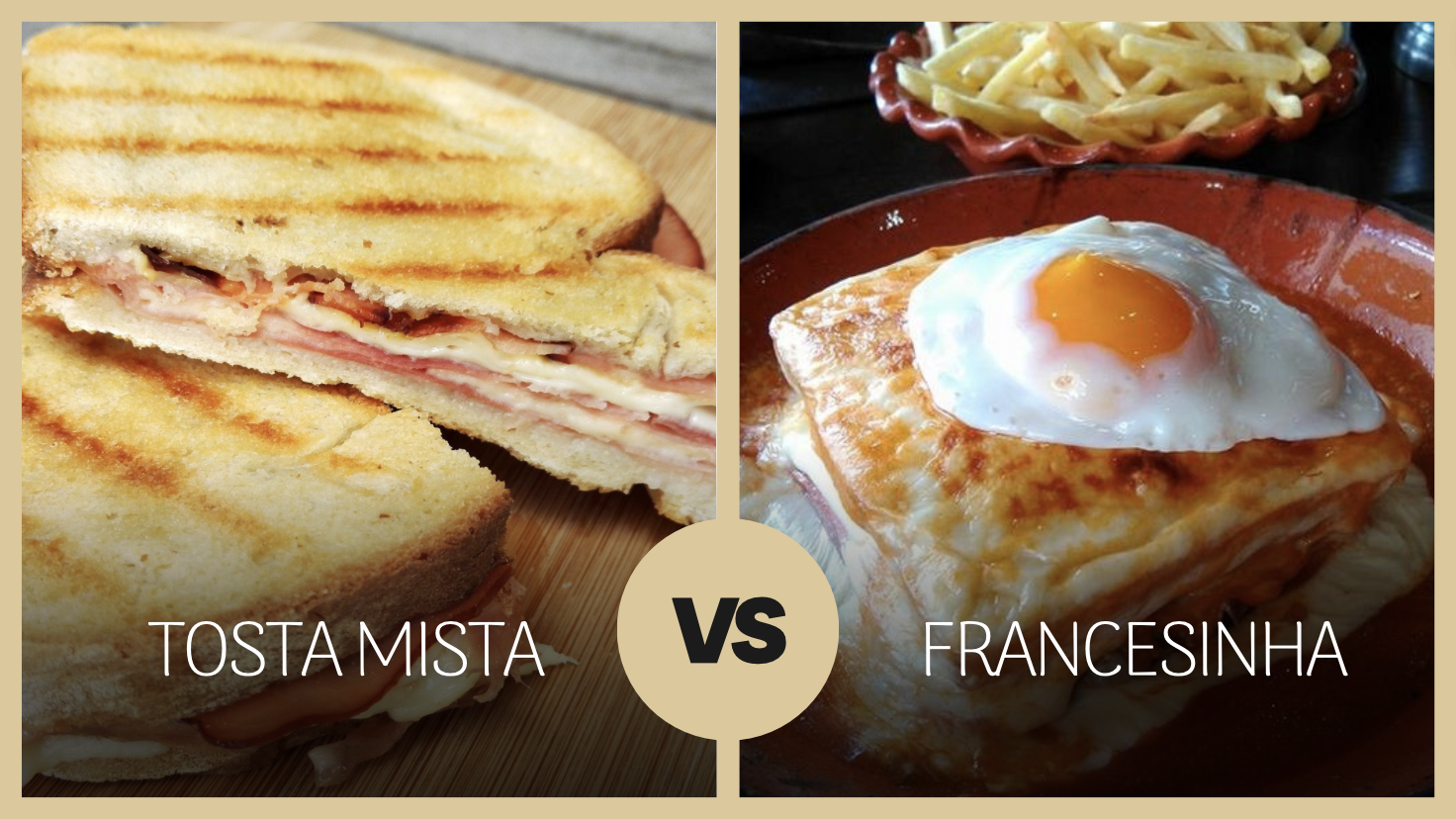
Tosta Mista VS Francesinha
3 – Arroz de pato VS Arroz de marisco
Arroz de pato
Arroz de pato ” is rice with duck. It’s one of Portugal’s northern specialties. The top is crispy and covered with “chouriço”. The Portuguese “chouriço” has a smoky taste, not the spicy Spanish “chorizo”. The great thing about this type of dish is that it’s very easy to make, and both young and old love it.
Arroz de pato is thought to have originated in Braga. It is often considered a festive dish or a family gathering. It is particularly popular in northern Portugal, where duck is abundant.
Arroz de marisco
Arroz de marisco is the “seafood” version of arroz de pato, and is a cousin of paella. The main difference with “paella” is that arroz de marisco is much moister than paella, and doesn’t include any meats: no chicken or chorizo.
It is a rice with shellfish, often a mixture of rice, shrimp, lobster, mussels, cockles, crab cakes…
This traditional dish, widely eaten in Portugal, originates from “praia da vieira”, in the Marinha Grande region, near Leiria(central Portugal).
I advise you to try this dish in its region of origin, but for those passing through Lisbon, I recommend the UMA restaurant in the Baixa Chiado district, whose specialty is this dish. However, you’ll have to be patient, as it’s a very small restaurant and it’s sometimes difficult to get a seat.
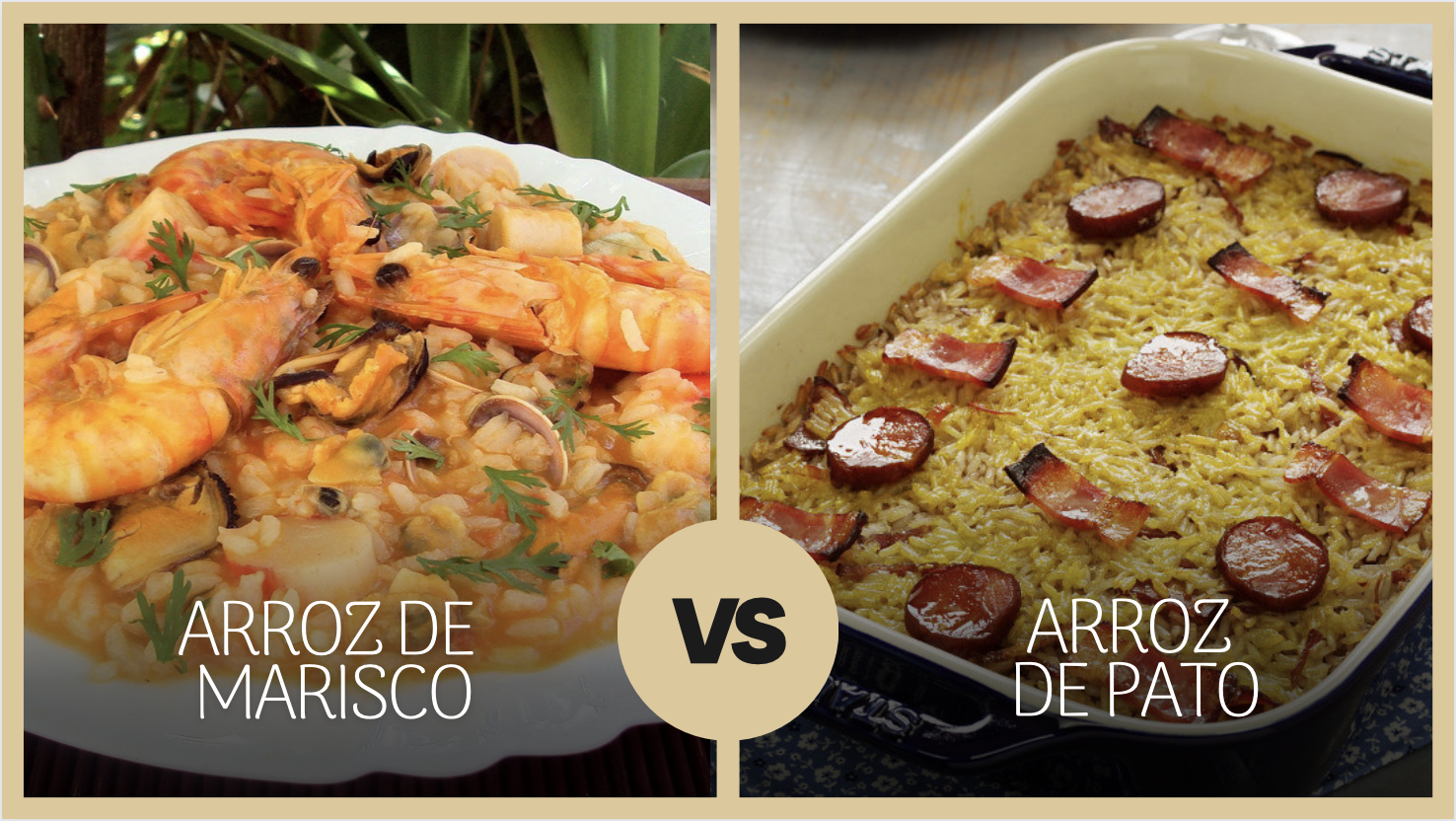
Arroz de marisco VS Arroz de pato
4 – Pasteis de bacalhau VS Rissois
Pasteis de bacalhau
Pasteis de bacalhau are a mixture of potatoes, eggs, parsley and onion fried in oil. They are shaped like a dumpling.
The birth of pastel de bacalhau is linked to the introduction of the potato in Portugal. In the southern half of Portugal, they are called “pastéis”, in the northern half “bolinhos”. It wasn’t until 1841 that the first recipe for cod in the form of “bolinho” or “pastel” was published, but not according to the current recipe for “pastéis de bacalhau”. It wasn’t until 1876 that two recipes similar to the current one appeared in João da Mata’s book “Arte de Cozinha” .
For those with a sweet tooth, I recommend you try the “casa Portuguesa do pastel de Bacalhau” recipe. These are pasteis de Bacalhau with cheese from the Serra da Estrela. Delicious! Yes, purists will take offense at the fact that cheese is added to pastel de Bacalhau, but it’s worth taking offense… because it’s a little nugget to be savored!
Rissois
The main competitors of pasteis de bacalhau are Rissois. Like pasteis de bacalhau, rissois are small fried snacks to be nibbled as an aperitif.
Rissois are small fried doughnuts, easily recognized by their half-moon shape. They come in a variety of flavors, the best known being rissóis de Camarão: shrimp fritters, and rissóis de Leitão: suckling pig fritters.
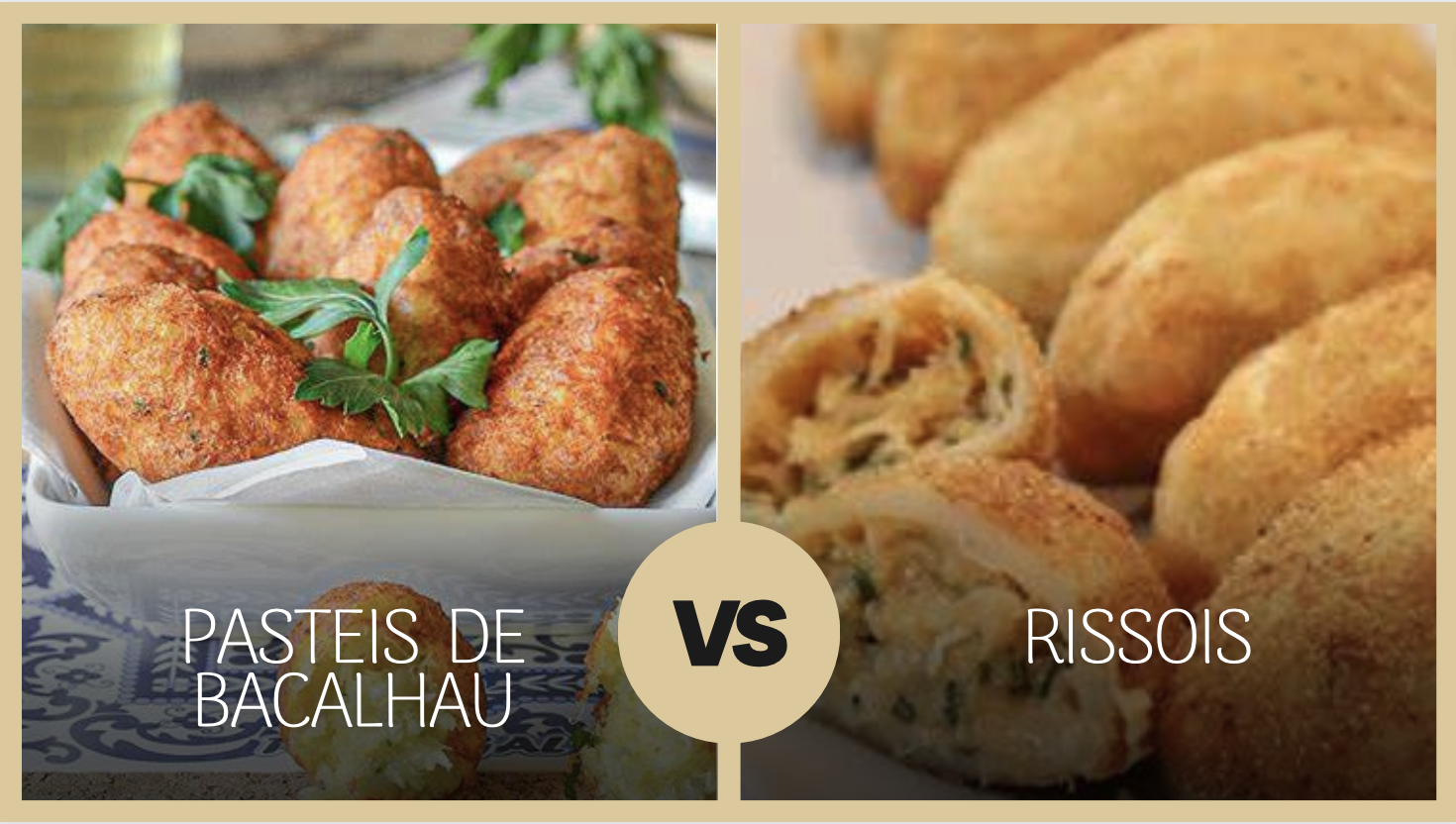
Pasteis de bacalhau VS Rissois
5 – Arroz doce VS Aletria
Arroz doce
When it comes to desserts, two ingredients are omnipresent in Portuguese cuisine: eggs and cinnamon! Arroz Doce is a perfect example. It’s a traditional Portuguese dessert consisting of rice cooked with milk, sugar and eggs, and often generously sprinkled with cinnamon.
The history ofarroz doce dates back to medieval times, when it was considered a festive and luxurious dish, reserved for the wealthy classes. It was often prepared for special occasions such as weddings and christenings. Over the centuries, it became more accessible to all social classes. Today, it’s a dessert you’ll find everywhere, all year round, but it’s particularly popular during festive occasions such as Christmas and Easter, as well as family gatherings.
There are many variations on this recipe, depending on the region of Portugal. Some regions add ingredients such as vanilla, raisins and almonds..
Aletria
Its competitor is thealetria, although this dessert is a little less well-known because it’s more rare. It is mainly found at Christmas time in Portugal.
In layman’s terms, aletria is an arroz doce without rice, but with vermicelli pasta instead.
This dessert has strong influences from the Moors of North Africa, who have long been present in Portugal. Its name comes from “iṭriyah”, an Arabic word meaning “angel hair pasta”. Depending on the region, it can be creamier or more liquid.
Like arroz doce, it is generously sprinkled with cinnamon, and for Christmas dinner the powder is used to decorate it with Christmas motifs.
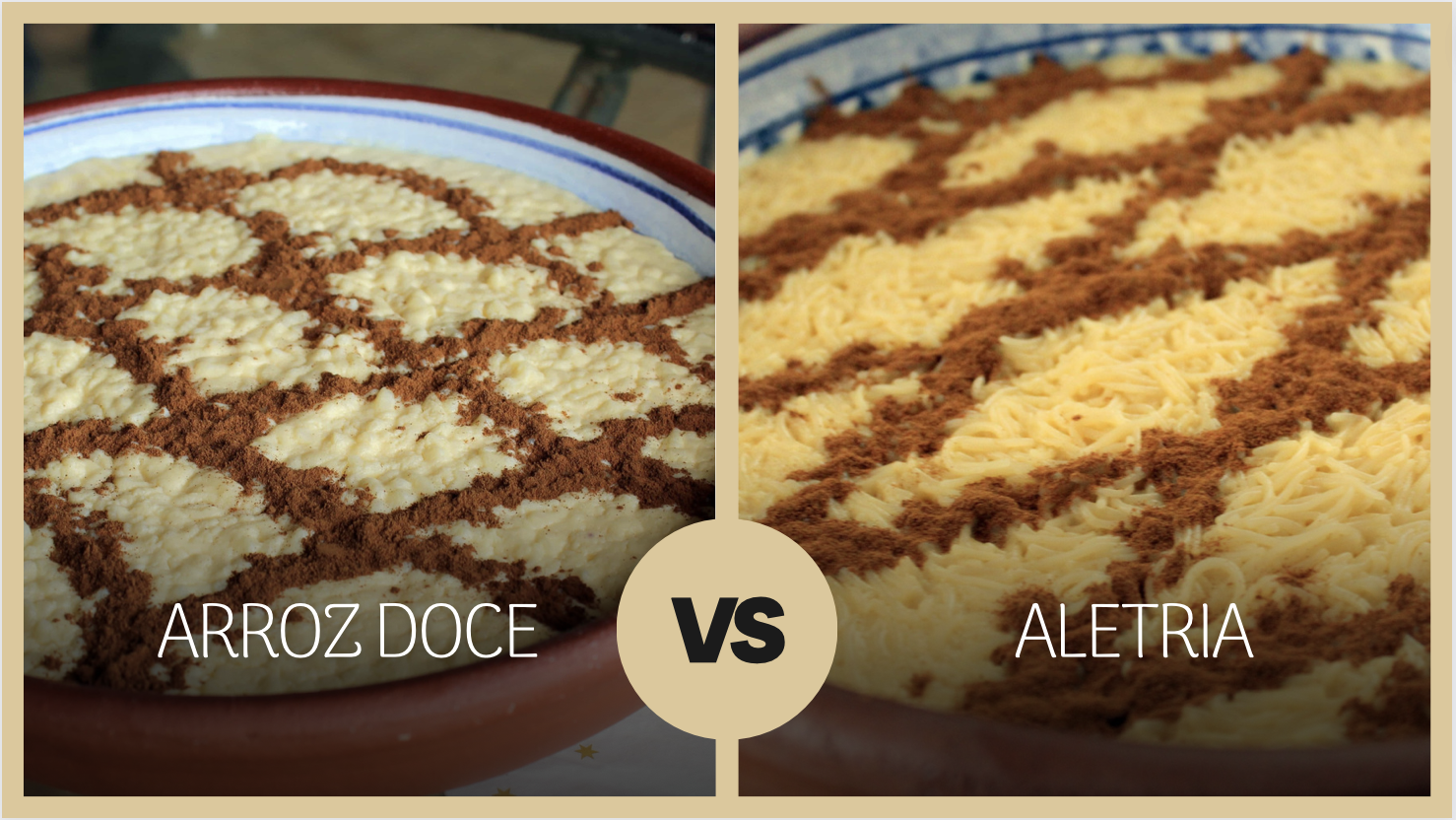
Arroz doce VS Aletria
6 – Pastel de Nata VS Queijada de Sintra
Pastel de nata
Pastel de nata (pronounced “Pachtel de nata”) means “pastry with cream”. You’re probably familiar with it, as it’s one of Portugal’s must-try specialties, and I often mention it in my articles. It’s a special puff pastry with cream. It can be eaten cold or warm, with or without cinnamon.
They were created in the 19th century in the Jeronimos monastery in Belém, a district of Lisbon. When the monastery closed, the brothers who lived there decided to sell the Pastéis de Nata recipe to a local bakery: the Fábrica de Pastéis de Belém. This bakery still exists today and is considered to be the place where the original Pastéis de Nata are still produced according to the original recipe (a recipe kept secret). An institution not to be missed.
Today, Pastéis de Nata are very popular not only in Portugal but worldwide, and are a symbol of Portuguese cuisine. They can be found in many bakeries and cafés in Portugal, as well as in Portuguese restaurants and delicatessens abroad. My favorite addresses: Manteigaria (Lisbon, Porto), Leitaria (Lisbon) and of course the Fábrica de Pastéis de Belém (Lisbon).
Queijada de Sintra
Queijada de Sintra has a false air of “pastel de nata”. It’s a specialty of the town of Sintra (30 km from Lisbon). Queijadas de Sintra are small, round, sweet pastries made with sweet curd cheese and eggs. Sometimes they are flavored with lemon or cinnamon. On top of this filling is a very thin crust.
The origins of this little pastry date back to the 13th century, when queijadas were used by farmers to pay the owners of rented agricultural estates in the Sintra region. If you’d like to try them, those at the “Casa Piriquita” pastry shop (founded in 1862) in Sintra’s historic center are very famous.
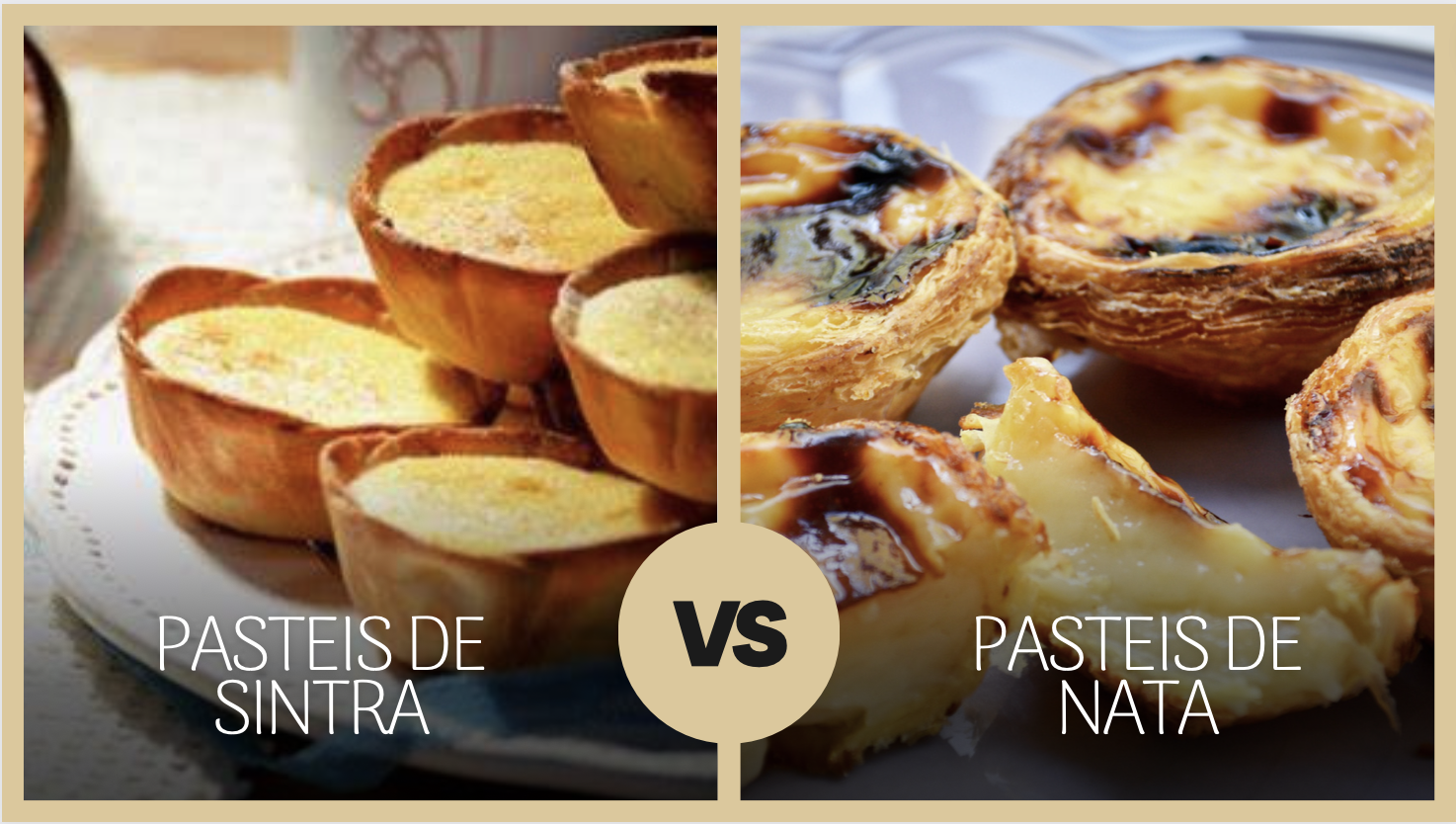
Pasteis de Sinta VS Pasteis de nata
In conclusion
As you can see, some Portuguese specialities have strong similarities.
Please let me know in the comments, what are your favorite Portuguese specialties?
Join us on social networks!
- Facebook group “Amoureux du Portugal”,
- Vivre au Portugal” Facebook page
- Instagram ” Living in Portugal
Articles Populaires
dernières annonces

2 bedroom apartment with sea view, 10km from Lisbon and 2km from the beaches
Rua da Bica, 103Discover this magnificent 2 bedroom apartment with views of Arriba Fóssil and the sea, 2km…

Duplex apartment with sea view 15 minutes from Lisbon
rua Santa Teresa 7Bedroom + duplex apartment with sea view and 15 minutes from Lisbon.

Single-storey house with swimming pool
Just a few meters from the magnificent bay of São Martinho do Porto, lies this…
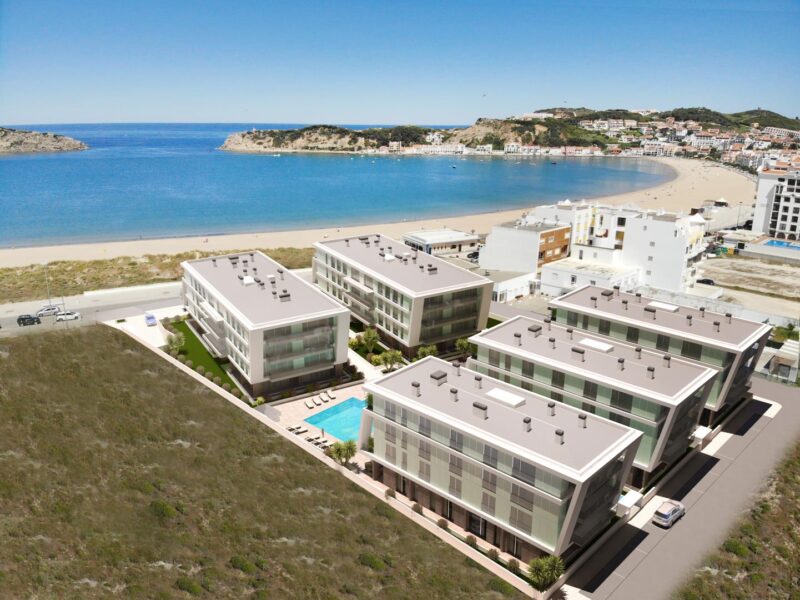
Condominium apartments facing the sea
São Martinho do PortoBeautiful apartments in São Martinho do Porto “Janela da Baía”! Located in the heart of…

Villa already finished and ready to move in: 4-suite bungalow on 750m2 plot in a quiet area of Azeitão
Rua de ParisHouse already finished and ready to move into! Close to shops and services, quick access…

Magnificent house with basement, indoor and outdoor pool in Verdizela/Aroeira
Verdizela/AroeiraNew turnkey project: magnificent single-storey villa, 498m2 in surface area, high-end finishes on a 1875m2…

Luxury apartment on the edge of a nature reserve
Your modern, spacious apartment between the beach and Lisbon’s capital. – Beach 5min – Golf…

House T3 1 10 min from Lisbon and 5 min from the beaches
PêraREADY TO MOVE IN! New T3 1 ready-to-live-in house in a quiet, rural neighborhood with…

4 bedroom villa with pool and jacuzzi in Aroeira
rua são miguelModern, minimalist architect-designed house with exceptional details in a quiet location in Aroeira 2-storey house…
Inscrivez-vous à notre newsletter
Recevez chaque mois les derniers articles de notre blog "la vie au Portugal" et notre sélection de biens immobiliers à vendre.



